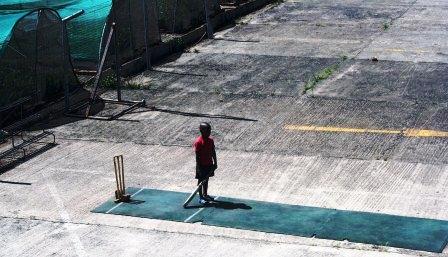
Story telling around the fire was incredible. We shared for hours. It was like a condensed version of the men’s retreat about getting in touch with your life story that my counselor friend hosts in Holmes County he calls Deer Camp. I had never sat in a circle with men and women in that open of an environment. God created holy ground around in that place. The firewood burned about as fast as we could put it in the rock lined pit. It was very smoky. Shameful historical details of lives lived were shared and chains fell off. At the end when we prayed, I had my eyes open. As the missionary we are supporting named Jason was closing, a shooting star streaked across the sky. I realized after hearing story after story of seemingly blessed Americans on a foreign continent that even under the most ideal circumstances, we all have our own brand of fatherlessness. Thank God there is hope and restoration. In Revelation 9, John talks about the battle four our souls being won:
And I heard a loud voice saying in Heaven, “Now have come salvation and strength, and the Kingdom of our God, and the power of His Christ; for the accuser of our brethren is cast down, who accused them before our God day and night.
And they overcame him by the blood of the Lamb and by the word of their testimony.
*****
First morning at Tabitha. A little girl was watching me write in my journal. She was chubby and wore pink slippers with plastic flowers. They don’t fit her little brown feet. Her toes hang over the end. The workers have a devotional with singing each morning. They sing in Zulu to gather everyone. Seemingly by chance, one will break into song and the others will join. One of the workers called Pretty beams like a brown faced angel when she sings. All I could understand was “I need your touch.” The furniture is covered by blankets. It looks old and dusty. We can hear buses out of the open window and men are yelling. A lady in a bright pink shirt holding a sleeping child prays in Zulu. Her words are rhythmic and she makes different popping sounds as part of her language. A little girl plays with fellow team member Lindsey’s baby blue plastic watch. Our choir’s hands go low and then they raise them high. The room smelled like urine, but it didn’t matter. Jan, pronounced Yan, addresses the group. He works with his wife who runs the orphanage’s school. He talks about removing doubt so that miracles can happen. He said they see miracles happen at Tabitha every day.
We were briefed by Issy, the assistant director of Tabitha. The director is out with back problems. “The kids want to love, but lack basic boundaries on occasions”, she said. I experienced it firsthand. All of them want to touch- they want to hold hands- they want to be held. It makes you ache on the inside. They have a problem with some of them overeating. Children who have suffered starvation don’t understand that there will be a next meal- you have to remind them. The recently lost a child who was HIV positive to chronic ear infections. The shock of the loss is painted on everyone’s heart. She was the very first baby at the clinic and now she is gone. The doctors only gave her three months to live, but God gave the world eight years. She will be a princess in heaven for sure. “I keep dishing out food for her”, Issy says.
All of Africa has been ravaged by HIV. We will be visiting the epicenter of the world crisis. We learn that an especially difficult problem for children is the gap in ARV medication between the young and teenagers. There is no gradual increase in the dosage, it simply doubles. The drug is very taxing on their little bodies. It is worse than chemotherapy or radiation.
The school downstairs has three classes and twenty-four students. The oldest are in about our equivalent to third grade. The school looks like any other, yet poorly equipped. The kids loved playing cricket. They use an old tennis ball instead of the harder cricket balls so they do not break out windows on the building which is not very far from where they play. They loved teaching me how to play –especially when they learned I could easily pound the tennis ball over the cyclone fence topped with barbed wire that surrounded their parking lot of a playground. It would have resembled a prison yard, except that the children had the run of the place. When my “six” went flying over the fence to their applause, a host of little orphans went under the fence to locate it in the bushes on the other side. These kids, HIV and poverty and all, were as happy as any at home. They beamed with pride to show me their puzzles and games that would cost almost nothing in the United States. I felt ashamed of my gluttony. Their sports equipment was terrible. I will fix that before I leave. I showed them North American on their laminated world map. I placed a blue star as close to Mississippi as I could get it. It really covered up a good bit of Alabama and Louisiana as well. At that moment I realized just how far I had traveled.
The kids on the playground were mostly boys with the exception of one colored girl. That’s how they refer to people of mixed black and white raise. Her name is Robin. She is magazine pretty and not an orphan. She is among the eight other kids that are dropped off in the morning by a caregiver. Because of the poverty and lack of quality schooling in the area, the orphanage school is considered desirable.
The boys were starved for touch. They rubbed the hair on my arm as if they had never seen a man before. Even more curious was the hair that peeked out above my v-neck color. My bracelet made by Mollie Ann says “Dad” out of wooden letters. Questioned by the group I was asked, “What does that mean?”
“I am a father”, I replied speaking to about three boys.
“Ah, and you have a wife?” One of the taller boys said in a tone looking for affirmation as he discovered I was wearing a ring.
“Yes, yes I do.”
“Where is she? Is this your wife?”
They pointed to Angie, also married and with a ring, but obviously to someone else. At this moment I realized that these young boys had no concept of family or family structure. No idea the role of a man or a woman in society. Many of the workers do not have husbands or they have been widowed by AIDS. It was a sobering exchange that made me swallow hard. A sense of burden swelled inside my body, starting at my wedding ring as the little brown hands, older appearing than they are due to the medicine, examined the jewelry that I almost never take off.
As we continued, the boys beamed as they showed me their books from Australia and their playhouse that resembled a makeshift homeless structure that you may think of seeing in a New York City alley or in the movie Slum Dog Millionaire. This playhouse was a micro example of what the rest of the week has in store for us. I left the boys to their study and joined some of the other team members that were playing with the younger kids on what looked more like a playground you would see at home, except that there were close lines and a barbed wire fence. The caregivers, who mostly only speak Zulu, several whom are HIV positive, were sitting under a tree on a plastic bench and singing. They would break into dance for no apparent reason. One woman with boyish hair wearing a blue apron with a red undershirt was especially fun. She was high on life. I later found out that her husband was dead from AIDS and she was having trouble with her meds. In the community in which we are serving, they burry between 150 and 300 people each week. The population is dying.
After a lunch provided to us by the saints that make up some of the Tabitha team, we packed food parcels for a distribution on Friday in Sweetwaters. Our lunch included various rolls and packaged cheese with a few varieties of strange looking deli meats. We also had iceberg lettuce and sliced tomatoes with an array of chips that had flavors like beef and spare rib. Tea is also served. I prefer the one they call Rooibos, which supposedly is used for a substitution for breast milk in the poorer areas. Tabitha estimates about 4,000 children are living without parents in child headed households. They do not have the life skills needed to survive on their own. The supplies were neatly packed into boxes that were easy to transport, but our job was to remove them from the expensive cardboard and place them into cheap plastic bags. The contents from which a family of up to six was to survive for a month included the following:
3 chicken bullion cubes
1 bag corn meal
2 packages of sugar
1 medium bag of brown rice
1 box of salt
1 bag of oxtail soup
1 box of tea bags
3 white candles about 18 inches long
1 bar of green soap used to wash clothes
1 bag of spices
1 can of pinto beans
1 can of tomatoes
3 cans of sardines
Sometimes they supplement the parcels with the greenhouse grown spinach. I packed the boxes slowly and deliberately. The others worked more quickly. We created a makeshift assembly line where we had five people removing the contents from the boxes and placing them in the bags with the others acting in supporting roles. My body moved in slow motion as I realized the magnitude of the hunger problem in an area within minutes of homes and restaurants as fine as you would see anywhere in the world. I took time to smell the spices and the soap. I wondered whether if one of our families had to live on the contents of this small package for a month if the way we think would change? I wondered if I would remember this sobering process within a week of stepping foot on the ground back home.
By the time we finished packing the boxes, the kids were out of school and again ravenous for our attention. I could not walk past a child who did not reach out for a hug or want to grab my hand and take me somewhere. The color of my skin, whether my face was shaven, what I wore or anything else about me did not matter. I was an adult human being and that was enough for another life to yearn for my love and approval. The afternoon tour was of the chickens and roosters and the box in which eggs were laid. I was again impressed with the little gardens that were located around the facility. They had a large mulberry tree and the chickens periodically laid eggs, of course. Their spinach is highly nutritious and easy to grow. Titus 3:14 provides a challenge. “Our people have to learn to be diligent in their work so that all necessities are met, especially among the needy, and they don’t end up with nothing to show for their lives.”
Issy invited us to gym with some of the kids who piled into the back of Tabitha’s only vehicle, which is a small Ford truck with a double cab and a camper shell over the bed. We loaded about 6 kids and one of our team members into the back. They hung out the windows and made faces at me as I took pictures. The little girls are stunningly beautiful. Their smiles are exponentially more infectious than HIV. The road to the gym was very African –people walking with umbrellas and ladies carrying multi-colored bags on their heads without effort. While seemingly in some back alley where you could be gunned down by guerilla fighters, the gym was huge and as nice on the inside as any in the states. A towering rock wall guarded the north side of the building. Athletic instructors lined up the multi-racial participants. One little Hindu boy had a bright orange spot on his forehead. The kids from Tabitha stood out a little. They were all wearing rubber crocks, which they piled up next to their juice before bouncing onto the mat. Issy explained to us that she would love to take more of the girls to gym, but the owner had been nice enough to provide five scholarships and there was no money for the rest. The cost is $100 per child per year. While their classmates had proper tumble outfits, most of the orphans wore shorts and t-shirts. It did not hamper their enthusiasm. As I took pictures of one of the girls stretching with a white girl with long blond hair dressed in red, she looked at her and questioned in her adorable South African tempo, “Is that your dad?”
My new little friend just smiled.
The business-man-I-can-fix-it side of me decided that I could easily raise $1,000 so that all of the orphans that wanted to go to gym could go, dressed in new clothes. I surmised that a short video on one of my websites could raise the funds in a matter of hours. I was later reminded by Jason that we must consider transportation, lack of workers, the cost of petro and a host of other issues. My enthusiasm was slightly deflated, but I quickly understood.
Issy, who is single, adopted a little black angel named Esther. She was the class pet of the instructor. She would be anyone’s. She had on a proper blue outfit and knotted hair. Issy beamed as spoke about Esther. She paid for Issy’s way so as not to take a scholarship away from one of the other children. She explained that Esther’s mother was 14 at the time of her birth. She suffered from mental difficulties and had three children in three years, but one was aborted when the young mother was six months pregnant through a drug that almost cost her own life.
I asked Issy about what it would take for the children to be legally free for adoption. She explained that many are without proper documents and that while there are social workers, there is limited transportation for the amount of work required for just one child. It takes many hours of investigation to create documents for children who have dead parents or parents that are mentally incapable due to the effects of the powerful ARV medications. The government dynamic and eleven national languages make foster care and adoption almost impossible. The government also wants Zulu children to be with Zulu families, but there are few Zulu families willing to take on another mouth to feed. I paused to reflect on the miracle it took for my friends the Kinsleys to bring home their son Alphie from the mission field. Don looked at me and reflected that “Africa is a 150 piece puzzle.”
“Make that a 1000 piece puzzle with a few pieces missing and without the box,” I added.
By: Craig Robertson





